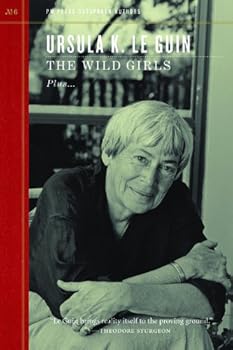![]() The Wild Girls by Ursula K Leguin
The Wild Girls by Ursula K Leguin
 “When her mother went to embrace her, Tudju made the gesture that put her aside.”
“When her mother went to embrace her, Tudju made the gesture that put her aside.”
Some topics carry inevitability in their DNA. When you read about Titanic, or the 1918 influenza pandemic, you know what’s going to happen. In Ursula LeGuin’s novelette The Wild Girls we have a good idea how it’s going to end. We don’t want to believe, but we know.
In the opening paragraphs, Bela ten Belen takes five companions and a male slave and leaves his City home to raid a nearby nomadic village. Bela is hunting for a “Dirt” girl to capture and raise to be his wife. He and his friends slaughter the unarmed adults in the village and take the children. Bela seizes a little girl, and soon discovers that her older sister, who was not captured, has followed them, not to attempt a rescue but simply to be with her sister.
The “Crown,” who live in the City, keep slaves, but so do the nomads and the artisan class, the Roots. With great economy, LeGuin paints an entire society from one city; the social structure, the religious and folkloric apparatus in place to maintain that structure, the economics, and the detailed rules for marriage, which seem to be an attempt to maintain a viable gene pool.
The story follows the two girls, now named Modh and Mal. Brought into the City, they are trained by Nata, the successful slave wife of Bela’s brother (Crown men must marry Dirt women). Modh and Mal are worried, because one of the raiders, Ralo ten Bal, left an ailing Dirt baby behind to die. Because the baby was not buried after she died, the girls fear that her ghost will follow them, crying for burial. Modh tried to explain to the captors that the baby must be buried when she was first captured, but she didn’t speak their language and could not make herself understood. Modh and Mal frequently hear the baby crying in their City compound, but as their lives get better, gradually the crying fades… at least, for a while.
The Crown women and the Dirt women stay together in a space behind a yellow curtain in their homes. In this space, Modh and Mal learn to dance and speak the Crown language, and Bela’s sister Tudju teaches Modh sword practice, so that she will have a practice partner. Here, the culture is passed on, and here, LeGuin momentarily, intentionally, steps into the story:
Modh did not say, “But—”
It was perfectly clear to her that it was a system of exchange, and that it was not a fair exchange. She came from just far enough outside it to be able to look at it. And, being excluded from reciprocity, any slave can see the system with an undeluded eye. But Modh did not know any other system, any possibility of another system, which would have allowed her to say, “But.” Neither did Nata know of that alternative, that possible even when unattainable space in which there is room for justice, in which the word “But” can be spoken and have meaning.
This, then, is the point of the story. Nata, the successful slave-wife, is kind, so she teaches the wild girls not to question, not to speak up, so that they won’t be whipped. Later in the story, the women stay close to Mal so that she won’t be raped, because it is the slave women’s duty to protect girls from the men who have the power.
LeGuin artfully lulls us into a sense of complacency, a feeling that things will be all right, until, with a sentence as sharp as a paper-cut, she reminds us that not all of the women who talk, work and practice dancing behind the yellow curtain are equal. Tudju, whose mother is a slave, is a Crown woman, with privileges the others do not have.
Modh is wed to Bela, and seems to be happy, but this story cannot have a happy ending. Ralo, the one who years ago left a baby to die, now demands Mal as a wife. He makes a substantial offer for her. The ten Belens refuse — and Ralo’s family makes a financial offer that they cannot turn away. From here, the story unfolds with a devastating precision.
LeGuin is examining a system, uncovering the inconsistency and the hypocrisy, and forcing us to as well. The slaves, male and female, in the ten Belen home are not physically brutalized. They have enough to eat. They are not beaten. They simply have no rights, no power and no voice. Bela ten Belen is a handsome man, an affectionate husband, a loyal brother. He also murdered innocent people and stole children, and was rewarded for it. How does a society change, if no one can imagine another way of being?
The story’s ending is not hopeful… but it could become hopeful. There are hints, only hints, that this is becoming a folktale. Like the forbidden delu, the “soul bags” that the slave Bidh gives to Modl and Mal, this story might be a bit of subversion, told after dark in the slaves’ quarters, holding in its folds a fragile seed of change.
I read The Wild Girls in PM Press’s small book with the same title. It also contains two essays by LeGuin, “Staying Awake While We Read,” and some thoughtful musings on modesty, a wide-ranging and whimsical interview by Terry Bisson, and some poetry. PM Press books do appear on the shelves of independent brick-and-mortal stores, so check there for it. It is a devastating story that is definitely worth the read.



This looks interesting. I think I’ll put this on my list. Thanks, Marion!